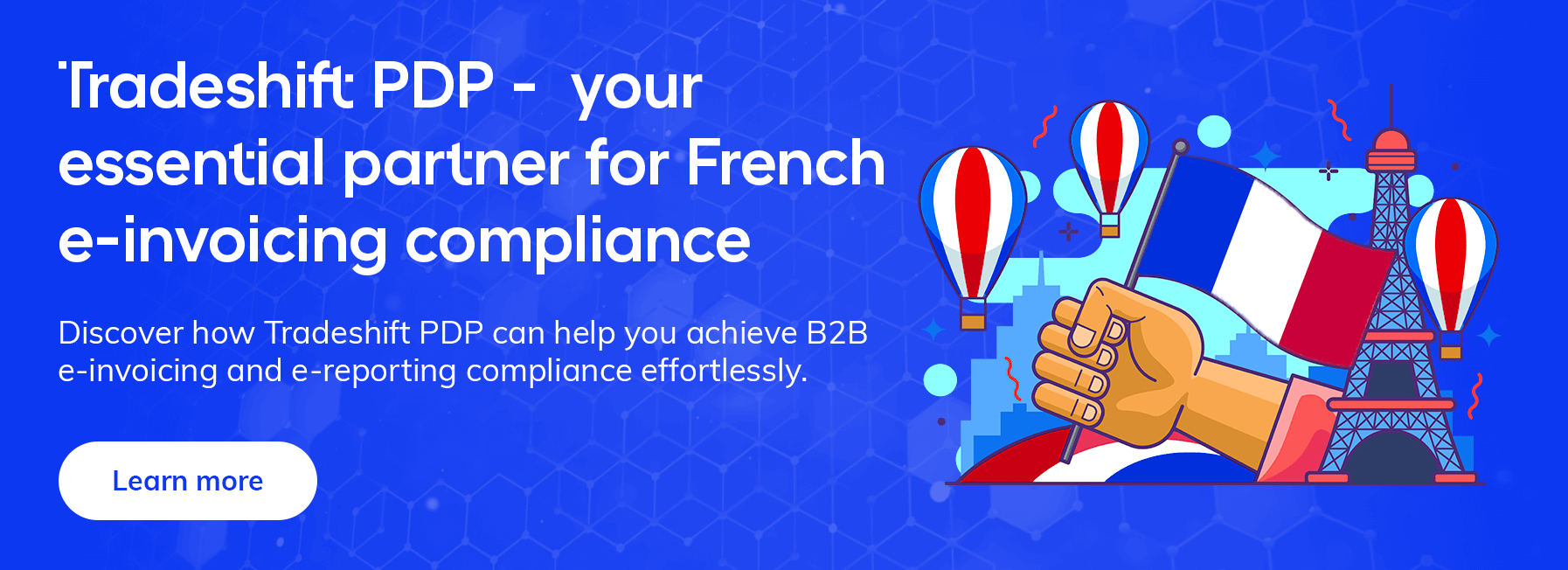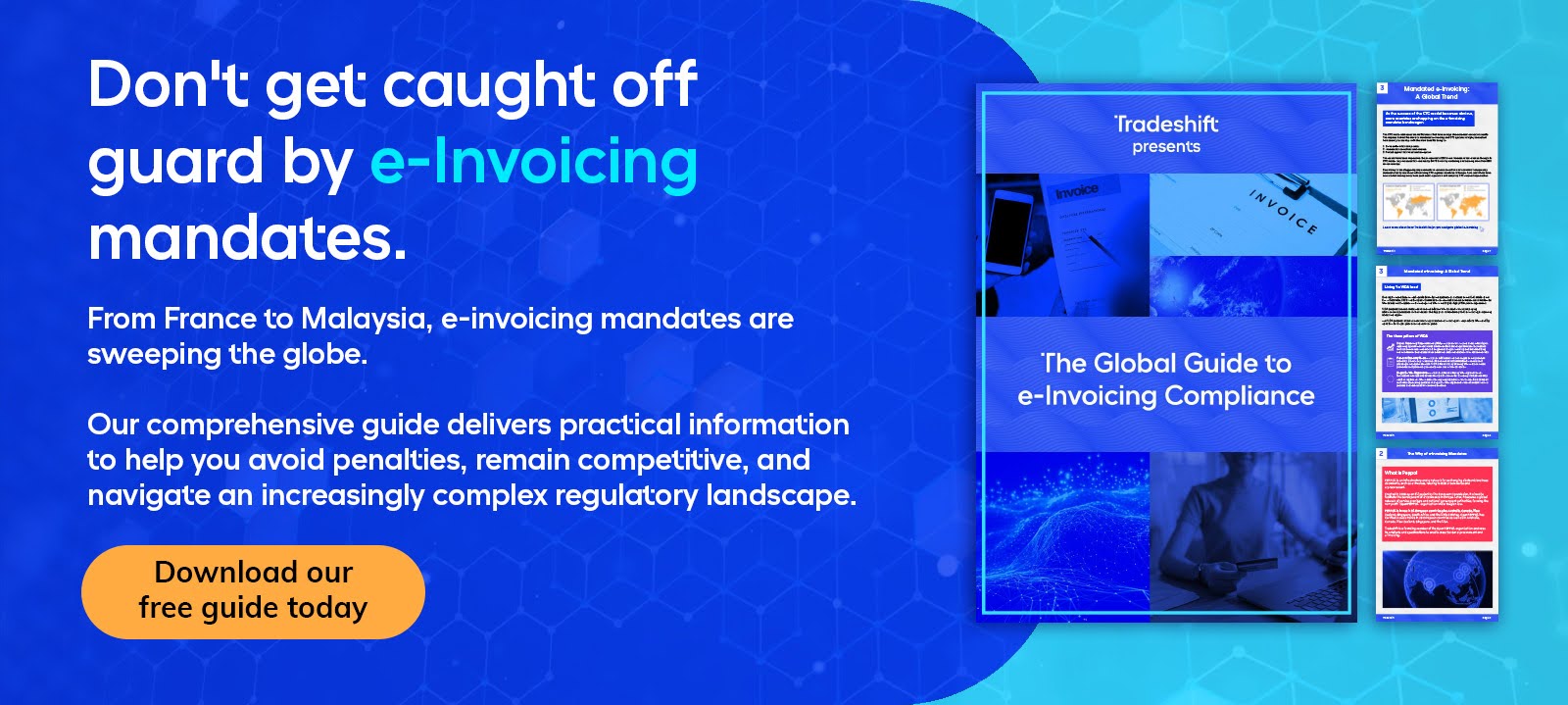French Portail Public de Facturation (PPF) drops e-Invoicing platform role
The new changes to the French e-Invoicing mandate mean businesses undertaking B2B invoicing must use a registered PDP for invoice submission and delivery.
By Ioana Ploesteanu, Product Marketing Manager, Tradeshift
Here’s what that means for you:
-
The Portail Public de Facturation (PPF) will no longer act as an e-invoicing platform.
-
The PPF will solely maintain the central directory and collect invoice tax information.
-
Registered PDPs will process invoices for all businesses nationwide.
-
As a registered PDP, Tradeshift is ready to help businesses make the transition in France
What’s the latest update from the French Government?
In a press release published on October 15th 2024, France’s fiscal and tax authority (the DGFIP) announced a significant change to the country’s e-invoicing mandate.
The DGFIP will stop developing the PPF as a government e-invoicing platform and instead promote PDPs (Plateforme de Dématérialisation Partenaire) as the only option for businesses to clear invoices.
This decision was made due to the success of the PDP registration process and the availability of over 70 registered PDPs (such as Tradeshift).
Read on for more details about how this change will affect your business.
What is the PPF and how has its role changed?
The PPF (Portail Public de Facturation), or “Public Portal for Invoicing,” is a government-managed platform. It was initially designed to perform three main functions:
- Serve as a free-to-use B2B e-invoicing platform for all invoice senders and receivers.
- Maintain a central directory of businesses.
- Act as a tax administration data hub for all invoice, transaction, and payment data.
The first function, that of a general-purpose e-invoicing platform, is being abandoned. The PPF will no longer process e-invoices for businesses.
Businesses must now use a registered PDP such as Tradeshift to comply with the mandate.
Instead of the initial “Y-model” for tax clearance, France will probably use a “5th corner model, with the updated technical specifications to be received soon.
We are in close contact with the French authorities and are adjusting our solution to accommodate any new updates.
This means that e-invoices will be cleared through a PDP, and real-time tax reporting will be handled through the PPF.
We’ll provide more precise details as they become available.
PDPs and the French e-Invoicing mandate: an expanding role
PDPs (Plateforme de Dématérialisation Partenaire) are e-Invoicing service providers vetted by the French government.
They are approved by the French authorities to connect to the PPF and clear invoices on behalf of businesses operating in France.
PDPs now play the central role in ensuring compliance with the French e-invoicing mandate.
Initially, businesses had two options: connect directly to the PPF, or choose a PDP. Now, using a registered PDP is the only way to comply.
Tradeshift is one of the first service providers to achieve registered PDP status in France.
We are a leader in Compliance-as-a-Service, providing innovative solutions that support businesses’ digital transformation and ensure they meet e-invoicing and tax clearance requirements worldwide.
Interoperability is Key:
The shift away from the PPF as a centralized platform highlights the growing importance of interoperability between PDPs.
To ensure a seamless e-invoicing ecosystem, PDPs must be able to communicate and exchange data with each other, regardless of their specific technology.
This prevents data silos and ensures that businesses can easily transact with any trading partner.
The adoption of the Peppol (Pan-European Public Procurement Online) model in France could further enhance interoperability by providing a standardized framework for e-invoicing across Europe.
This would enable French businesses to easily trade with partners in other Peppol-adopting countries.
Don’t Delay:
Mandatory e-invoicing requirements take effect in 2026. While this may seem far off, businesses must start the process of selecting a PDP now.
Why choose Tradeshift as your e-invoicing and PDP registered (PDP immatriculée) platform regardless of your company size?
Although the mandate initially targeted medium and large businesses, any sized company can benefit from using a PDP like Tradeshift. Here’s why:
- Save time and money: Avoid multiple investments by letting Tradeshift handle all the technical aspects and integrations with the government and your clients’ systems.
- Ensure compliance: Stay up-to-date with the latest regulations. Tradeshift automatically updates its platform to reflect any changes.
- Benefit from secure data exchange: Enjoy secure and reliable data exchange between you, your clients, and the tax authority.
- Gain complete visibility: Track the entire invoice lifecycle, including payment due dates, and easily communicate with your clients through the Tradeshift platform.
- Access early payment options: Take advantage of early payment options for faster access to working capital.
Regardless of your size, with Tradeshift as your B2B e-invoicing and PDP registered (PDP immatriculée) platform, you get all the benefits outlined above.
With Tradeshift, you get more than just compliance. We offer a better way to manage your business finances.
Easily send and receive invoices through our platform, which manages your entire clearance flow.
Tradeshift also facilitates collaboration with your clients, offers a simple onboarding process, and helps enrich documents for faster processing.
Companies like Air France and Disneyland Paris rely on Tradeshift to manage e-invoicing compliance worldwide.
We offer compliance-as-a-service in over 70 countries and have a streamlined process for meeting clearance mandates in 12 countries.
We are also the only company offering cross-zone “fapiao” e-invoicing capabilities in China.

